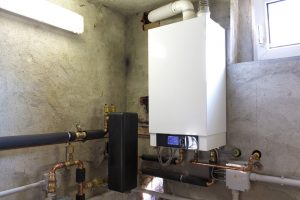 The boiler is one of the basic central home heating systems, competing with the furnace and the heat pump for the best way to deliver whole-house comfort. We have extensive experience working with boilers, from new installations to repairs of just about any type. We’d like to share some of our boiler knowledge with you to help you understand a few basic, but often misunderstood, facts about these heating systems.
The boiler is one of the basic central home heating systems, competing with the furnace and the heat pump for the best way to deliver whole-house comfort. We have extensive experience working with boilers, from new installations to repairs of just about any type. We’d like to share some of our boiler knowledge with you to help you understand a few basic, but often misunderstood, facts about these heating systems.
1. Boilers Don’t Boil
The name boiler doesn’t technically apply to most boilers today. The earliest boilers used for businesses and homes did boil the water in them to change it into steam to provide heat. However, the technology of boilers has advanced to the point where steam heat isn’t necessary for proper heating. A boiler heats the water to 145 to 190°F, which doesn’t convert it into steam. Steam boilers still have applications, usually in industrial buildings, but the boiler serving your home doesn’t boil the water.
2. Boilers Don’t Waste Water
Sometimes homeowners are concerned that their boiler system will start to run low on water and need to have more added. However, this isn’t the case—boilers don’t lose any water during the heating and cooling cycle they go through. Boilers are sealed systems, and the water inside should circulate for the system’s lifetime. The only way boilers can lose water is through leaks, which are a repair issue.
3. Boilers Are Usually More Energy Efficient Than Furnaces
HVAC contractors often suggest boiler systems for new homes because of their high energy efficiency compared to furnaces. But since gas boilers and furnaces both use natural gas burners to provide heat, what makes boilers more efficient?
There are a few reasons for the improved efficiency of boilers. But the most important one is the difference in the heat transfer medium. Furnaces transfer heat using air, and boilers using water. Water is more effective at heat transfer: just think of what it feels like to place your hand in 100°F water and 100°F air! The better heat transfer allows boilers to use less energy to deliver the same amount of heat.
4. Boilers Can Improve Air Quality and Make a Home Cleaner
Here’s a benefit that homeowners often don’t realize boilers can provide. Furnaces and heat pumps blow air through ductwork, and this also blows around dust inside the ducts and then circulates it around the house. This makes the air dustier and leaves more dust around furnishings in the home. In a six-room house, this can be 40 lbs. of dust circulated per year. Boilers, on the other hand, radiate heat from baseboard heaters, in-floor pipes, and radiators. No dusty ducts, no blowing air pollutants around. A boiler can be a great help for a household with people who have allergies and asthma.
To schedule professional boiler services in Chicago, IL, you can trust to our HVAC team. We work with all types of home heating systems.
ServiceMax is open 24/7, all day, every day! Reach out to us any time for boiler help in Chicagloand.